Explore the top 5 voice AI platforms in 2025 with faster performance, multilingual support, transparent pricing, and enterprise-grade scalability.

Prithvi Bharadwaj
Updated on
December 26, 2025 at 11:30 AM
Voice AI is rapidly becoming a core component of enterprise automation strategies. In fact, 42% of enterprise-scale companies (with over 1,000 employees) have already deployed AI solutions, while another 40% remain in exploratory or pilot stages. As adoption accelerates, many businesses are reassessing whether their current platforms—such as Sierra AI—can keep up with growing demands.
From latency issues to language limitations and unclear pricing models, organizations are increasingly seeking platforms that offer better real-time performance, scalability, and long-term ROI. Whether you're deploying voice AI for support, logistics, healthcare, or finance, the right provider should align with your domain needs while remaining flexible and cost-effective.
This guide unpacks the key criteria to evaluate and explores the top Sierra AI alternatives in 2025—platforms that offer faster, smarter, and more transparent voice AI solutions designed for scale.
TL;DR — Key Takeaways
Voice AI adoption is growing fast, but not all platforms meet the latency, language, or integration needs of today’s enterprises.
Sierra AI users may face challenges like inconsistent real-time performance, opaque pricing, or limited language adaptability—driving demand for stronger alternatives.
Top alternatives in 2025 include platforms like Smallest.ai, Deepgram, Kore.ai, PolyAI, and Talkie.ai, each offering differentiated strengths in speed, customization, compliance, and vertical focus.
Smallest.ai leads for real-time, expressive, and scalable voice automation, with under-100ms latency, voice cloning, and full-stack agent tools.
When choosing a provider, prioritize scalability, transparent pricing, language coverage, integration ease, and enterprise compliance to future-proof your voice automation stack.
What to Consider When Choosing a Sierra AI Alternative?
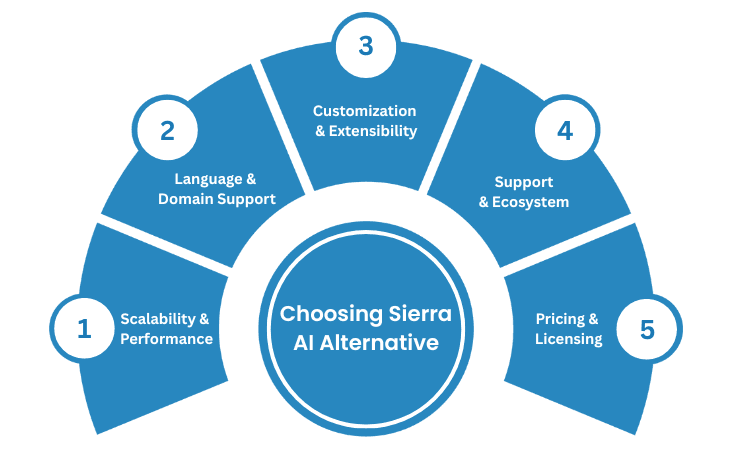
When evaluating Sierra AI competitors, it's important to focus on the capabilities that directly support your business's long-term goals. Each solution on the market offers different strengths, but not all of them will align with your technical or operational needs. Below are the key criteria that help you make a clear and confident comparison.
Here are the core features you should weigh carefully before making a shift:
Scalability & Performance: Systems should support real-time interactions while maintaining consistent performance during high traffic or concurrent usage scenarios. AI tools that fail to scale well can disrupt operations and delay response times during peak usage periods.
Language & Domain Support: Look for platforms offering a wide selection of languages and domain-specific models tailored to your industry or use case. This ensures better accuracy and relevance in communication, especially for customer-facing applications or technical content.
Customization & Extensibility: Prioritize solutions that offer flexible APIs, detailed documentation, and developer tools for easy integration and long-term adaptability. Deployment options, cloud-based, hybrid, or on-premise, should also fit your existing infrastructure and data privacy needs.
Support & Ecosystem: Strong community backing, accessible documentation, and vendor-led onboarding or training can significantly reduce implementation delays. Without these, your teams may face steep learning curves or increased dependence on third-party consultants.
Pricing & Licensing: Transparent pricing, flexible usage tiers, and enterprise-grade licensing options make it easier to plan long-term budgets. Evaluate whether the platform offers free trials or pilot programs to validate its capabilities before full deployment.
The next step is to look at specific options available today. Let's turn our attention to some of the top Sierra AI competitors you can consider, each offering distinct features suited to different needs.
Also read: Who are the leading AI platforms for developing voice assistants?
Best Sierra AI Alternatives and Competitors in 2025
The AI voice landscape is evolving fast, and not every platform meets the same standards for speed, quality, or flexibility. If Sierra AI hasn’t delivered on your specific needs, stronger alternatives are now gaining traction. Here are the ones worth your attention:
1. Smallest.ai
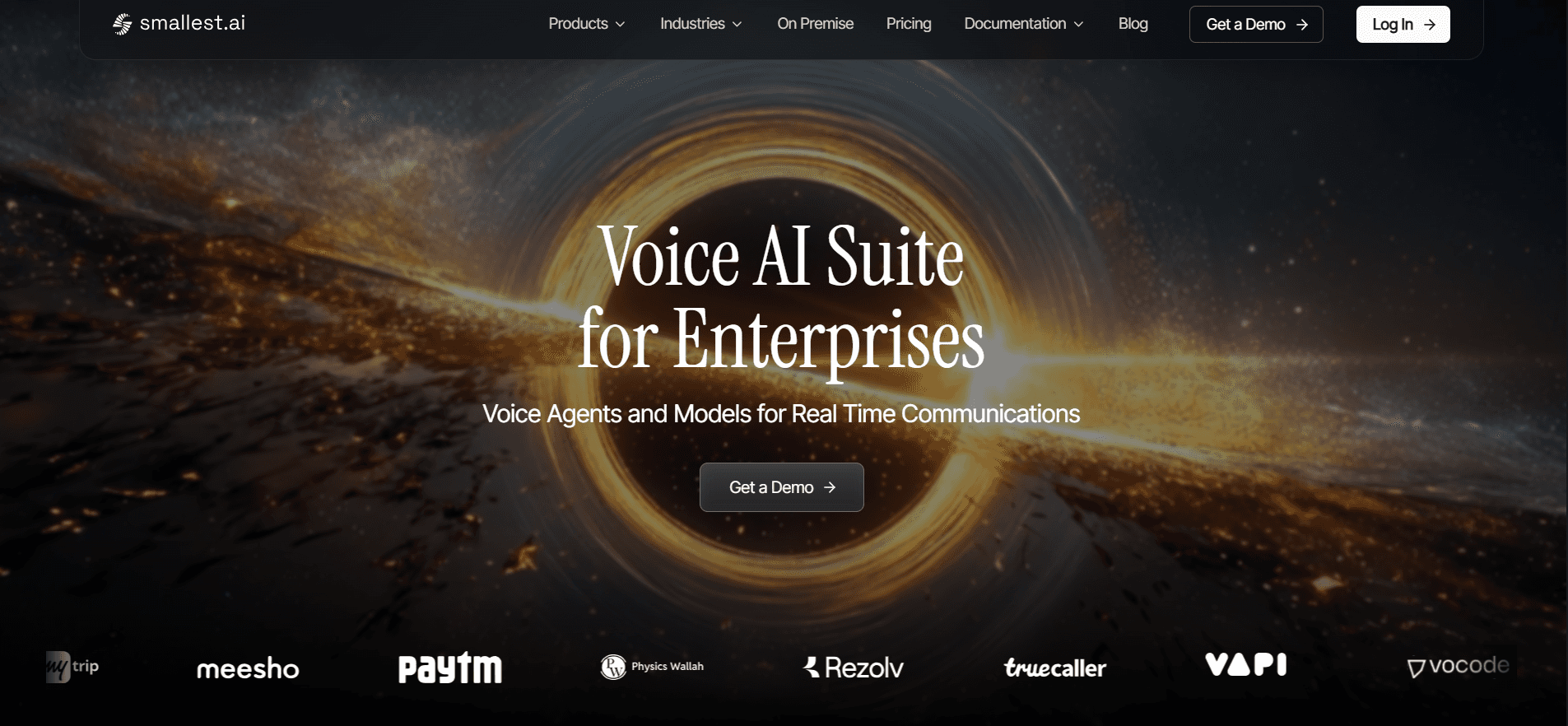
Smallest.ai offers a unified full‑stack voice AI platform built end‑to‑end, from the TTS model to infrastructure and agent workflows. Their Lightning V2 model produces studio-grade, expressive audio in over 30 languages with less than 100ms latency, plus instant voice cloning from just 5–10 seconds of audio. This combination empowers businesses to deploy real‑time voice applications that sound deeply human, operate at scale, and cost a fraction of major alternatives.
The platform includes two main products: Waves for voice synthesis (text-to-speech, cloning, emotion tuning) and Atoms for live AI agents that can call, book, support, or collect debts in real time. Together, they streamline integrations with CRMs, IVR systems, and edge devices like smartphones, enabling high automation with minimal setup.
Key Features
Lightning V2: Speed & Efficiency: Generates up to 10 seconds of lifelike audio in under 100 ms using REST API, ideal for real-time conversation flows.
Low VRAM Footprint & Edge Deployment
Runs on devices with under 1 GB VRAM, making it feasible on laptops, mobile devices, or local servers.Multi-Language Support & Rapid Accent Training: Supports 16+ languages with fast phoneme-based adaptation, enabling new accents with minimal data.
Emotionally Expressive Speech via Style Diffusor: Modulates tone and rhythm to deliver emotional nuance or brand character in speech.
Instant Voice Cloning: Users can generate recognizable voice clones from just 5–10 seconds of sample audio, enabling branded experiences.
Full Agent Stack (Atoms): APIs support voice and SMS workflows, CRM connections, campaign scheduling, and analytics dashboards.
Flexible Pricing Plans: Smallest.ai pricing starts with a free plan, scales through personal ($49/mo) and business ($1,999/mo) tiers, and offers custom enterprise plans, with usage rates and voice costs decreasing as you scale.
Enterprise Compliance & SLA Support: Built-in HIPAA, SOC 2, GDPR, ISO 27001 compliance; supports on‑premise or VPC deployment for regulated industries and includes uptime SLAs.
Where Smallest.ai Delivers Real Impact
Debt collection: Automates payment reminders, negotiates with empathy, and ensures compliance with SOC 2, HIPAA, and PCI.
Logistics: Handles pre-dispatch address checks, delay notifications, and exception management to reduce failed deliveries.
E-commerce: Manages abandoned carts, FAQs, returns, and promotions through 24/7 conversational voice agents.
Banking and finance: Supports lead qualification, account inquiries, and onboarding while integrating with legacy systems.
HR and recruitment: Screens candidates with consistent scoring, schedules interviews, and processes applications at scale.
Smallest.ai delivers unmatched speed and voice realism at scale, thanks to its purposeful architecture and cost structures. For teams focused on real-time voice interaction, flexibility, and compliance, it offers clear advantages over broader platforms like Sierra AI.
2. Kore.ai
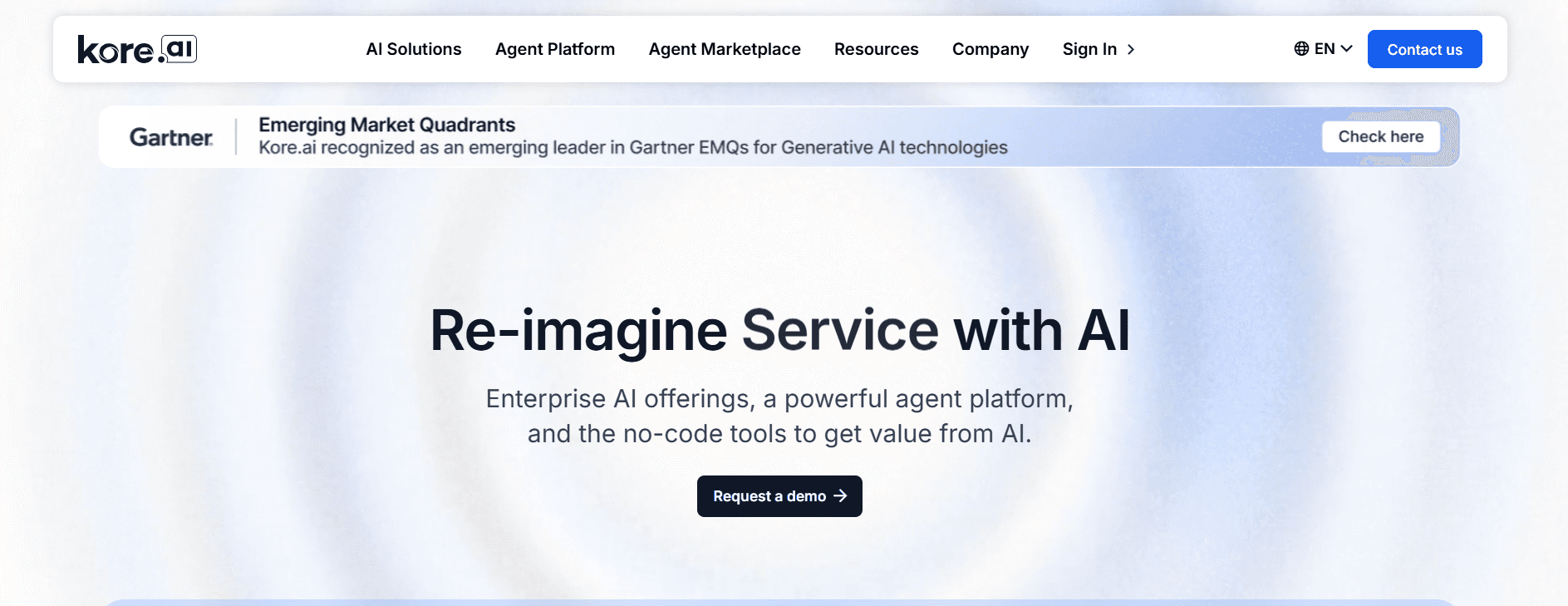
Kore.ai provides an omnichannel AI agent platform that supports voice, chat, email, and social media in a unified system. The platform offers a visual no-code builder alongside pro-code workflows, enabling both technical and non-technical users to create solutions. It supports over 100 languages and includes generative AI tools and enterprise-grade compliance.
Key Features
True Omnichannel Reach: Build once and deploy across more than 40 digital and voice channels, including web, SMS, IVR, and social media, with full context continuity.
No-Code & Pro-Code Agent Builder: Choose a drag‑and‑drop visual design for rapid setup or switch to JavaScript or Python nodes for advanced customization.
Generative AI Capabilities & Templates: Use over 75 prebuilt agent templates, plus built-in generative AI models for autonomous conversation flows.
Voice Integration & Biometric Authentication: Utilizes ASR and TTS engines like Google Cloud, Azure, or Nuance, with optional voice biometric authentication.
Enterprise Compliance & Context-Aware Analytics: Includes agent tracing, observability dashboards, security guardrails, and multilingual support in over 100 languages.
Kore.ai delivers broader channel support and flexibility with its no-code design and language coverage. But while it's enterprise-ready, voice-specific automation may still face limitations when compared to dedicated platforms.
3. PolyAI
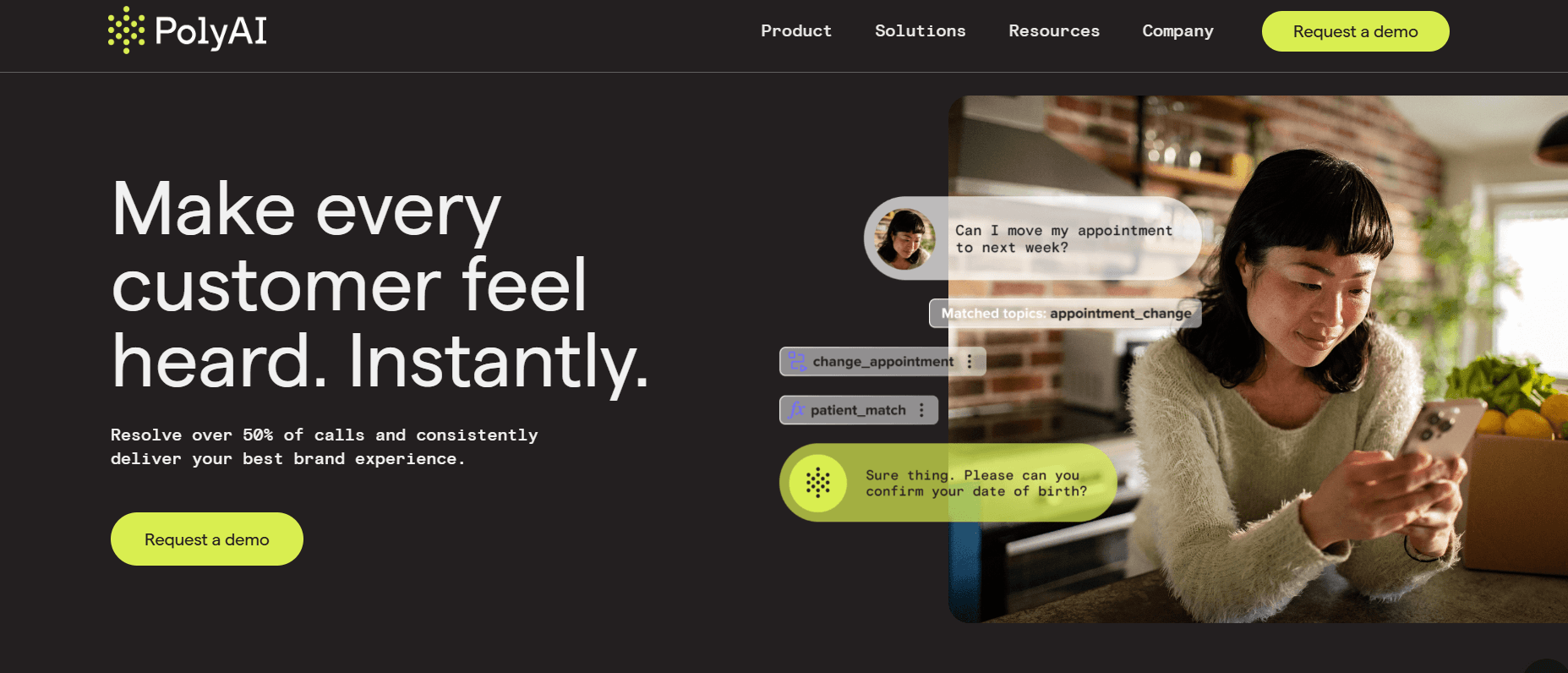
PolyAI builds enterprise-grade voice assistants tailored for industries such as hospitality, retail, banking, and healthcare. Its agents handle natural, fluid speech, including interruptions and topic shifts, and deploy in under six weeks while supporting many languages and enterprise compliance. These voice agents resolve more than 50% of inbound calls autonomously, boosting CX scores and reducing support overhead.
Natural, interruption‑friendly dialogue: Agents manage spontaneous speech and topic changes without losing context.
Multi‑language and accent support: Operates fluently in over ten languages with brand‑tuned voice identity.
Rapid turn‑up: Design, integrate, and launch within six weeks, no replatforming needed.
Built‑in analytics & compliance: Dashboard shows sentiment, resolution trends; certified for SOC 2, ISO 27001, and GDPR.
Fit for enterprise teams that rely heavily on voice calls, PolyAI delivers clarity, speed, and natural speech handling superior to many generalized platforms. However, it still focuses narrowly on voice-first scenarios, so broader multichannel needs may demand more flexible platforms.
4. Deepgram
Deepgram is a developer-first platform known for its ultra-fast automatic speech recognition (ASR) technology and customizable voice models. It powers real-time transcription, call analytics, and voice automation for enterprises across support, finance, and logistics.
Key Features
End-to-End ASR Engine: Built from the ground up using end-to-end deep learning for speed and accuracy.
Streaming & Real-Time Transcription: Supports real-time transcription at sub-300ms latency — ideal for live voice workflows.
Multi-Language and Accent Support: Includes models trained on diverse accents and global languages, making it ideal for international operations.
Custom Vocabulary & Tuning: Tailor models to your business terms, acronyms, and product names for more accurate transcriptions.
Noise Robustness: Designed to handle noisy environments like warehouses, contact centers, or on-road calls.
Flexible Deployment Options: Offers both cloud and on-prem deployment to meet compliance and data privacy needs.
While it doesn’t provide full conversational agent tooling out-of-the-box, its high-accuracy, low-latency voice engine makes it a solid foundation for companies building real-time voice workflows.
5. Talkie.ai
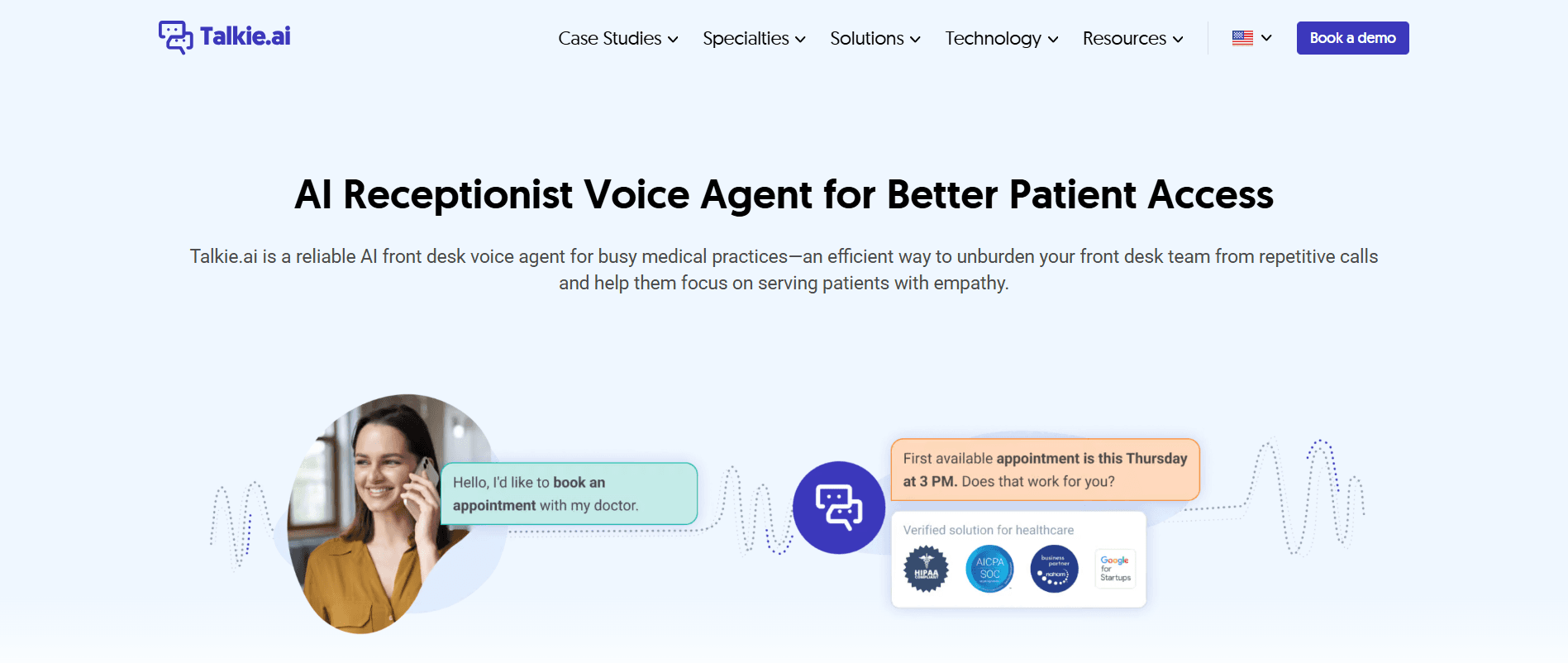
Talkie.ai specializes in voice assistants built specifically for medical clinics and healthcare providers. Its agents automate up to 85% of patient calls, handling scheduling, prescription refills, triage, and FAQs with seamless EHR integration. The platform supports 24/7 multilingual service and complies with HIPAA and SOC 2 Type II standards.
Key Features
EHR & Telephony Integration: Directly connects with ModMed, Athenahealth, Elation Health, and other EHR systems to manage appointments and patient data.
Automates Routine Workflows: Handles scheduling, prescription refills, FAQ responses, smart routing, and reminders autonomously.
Multilingual Support & 24/7 Availability: Operates in 15+ languages and offers round-the-clock call coverage without human staffing.
Compliance & Analytics: Fully HIPAA‑ and SOC 2‑certified, with dashboards that track call trends, routing efficiency, and workload impact.
Talkie.ai shines when patient access and medical workflows drive most call traffic. While Sierra AI provides broader channel coverage, Talkie gives stronger results for healthcare providers needing reliable, voice‑centric automation.
Choosing the Right Sierra AI Alternative in 2025
Ultimately, the best Sierra AI alternative depends on your organization’s voice automation goals — whether it’s real-time responsiveness, domain-specific workflows, cost efficiency, or compliance.
Here’s a quick breakdown of where each platform shines:
Platform | Best For | Key Differentiator |
|---|---|---|
Smallest.ai | Real-time, expressive voice automation at scale | Ultra-low latency (<100ms), voice cloning, edge-ready |
Deepgram | Building high-accuracy transcription pipelines for real-time voice | Fast, customizable ASR engine with strong dev-first integrations |
PolyAI | High-volume customer service with natural, fluid conversations | Handles interruptions and complex speech reliably |
Kore.ai | Omnichannel automation with enterprise-grade compliance and tooling | No-code + pro-code builder with 100+ language support |
Talkie.ai | Healthcare clinics automating patient access and communication | Deep EHR integrations, HIPAA-compliant, 24/7 coverage |
Conclusion
Finding the right Sierra AI alternative depends on how much control, scale, and flexibility your operations need. While tools like Retell.ai, Poly AI, Kore.ai, and Talkie.ai serve niche or broader use cases, the demands of high-volume, real-time voice interactions call for a platform that can go beyond canned scripts or surface-level integrations.
Smallest.ai stands out not because it does everything, but because it does what matters, fast, accurate, scalable voice that fits into your stack without friction. Its live, speech-native infrastructure, deep language reach, and transparent pricing model make it a reliable long-term fit, not a temporary patch.
Book a demo with Smallest.ai today and see how you can build smarter voice workflows that actually move the needle.
Frequently Asked Questions (FAQs)
1. How do I evaluate which AI voice platform is right for my business?
Start by defining your operational priorities: speed, reliability, language range, compliance, or developer flexibility. Then evaluate platforms based on how they support those needs—not just their marketing claims.
2. What matters most in a voice AI platform?
Real-time response, multilingual accuracy, ease of integration, and transparent pricing are foundational. Bonus points if the platform offers fast setup, low-latency performance, and flexible deployment (cloud, on-prem, edge).
3. How important is real-time performance in voice automation?
Very. In high-stakes workflows like customer service or logistics, even 1–2 seconds of delay can hurt user experience and trust. Look for platforms with sub-100ms latency if you need real-time responsiveness.
4. Is multilingual support standard across voice AI platforms?
Not always. Some platforms support only a handful of global languages, while others excel at regional or accented speech. Check both the number of languages and how well the platform handles nuanced variations.
5. Can voice agents integrate with our CRM or healthcare systems?
Yes—if the platform offers open APIs or prebuilt connectors. Some tools integrate directly with CRMs, EHRs, or TMS platforms, while others may require custom middleware.
6. Is voice AI compliant with data privacy regulations?
That depends on the provider. For regulated industries, look for SOC 2, HIPAA, GDPR, and PCI-DSS compliance. Ask whether data is stored, how it’s used for training, and what audit controls are in place.


